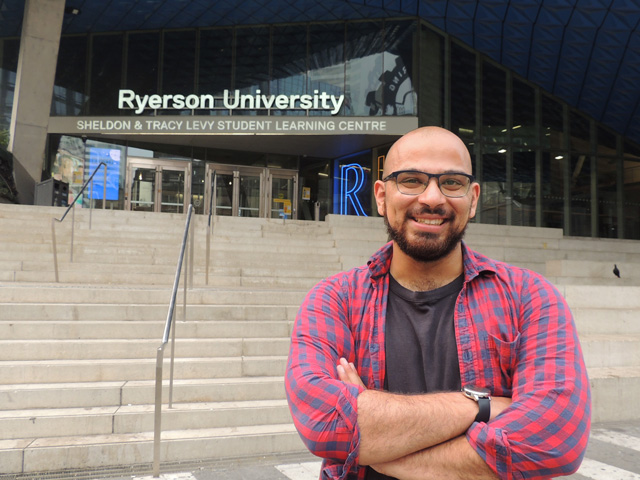Ryerson student recognized for excellence in the field of medical physics

Mark D'Souza, recipient of the Sylvia Fedoruk prize
“Mark is not afraid to try new things,” says Dr. Arman Sarfehnia, adjunct faculty member of Ryerson’s Department of Physics and medical physicist at the Odette Cancer Centre at Sunnybrook Hospital. “He’s not afraid of failure and learns from what doesn’t work. That approach to research and experimentation is one of many reasons he has been recognized.”
Sarfehnia is describing Ryerson PhD student Mark D’Souza, who was recently awarded the 2021 Sylvia Fedoruk Prize for the best publication in the field of medical physics. The prize selection process is a multi-stage procedure conducted by a panel of anonymous nominators and judges belonging to the Canadian Organization of Medical Physicists (COMP). Only one prize is awarded annually.
“It’s early in his career to have received one of the most prestigious prizes in Canada in this field,” adds Sarfehnia. “That speaks to Mark’s curiosity and investigative mindset combined with a very systematic and methodical approach to research. He’s very driven. He’s also passionate about what he does.”
D’Souza’s passion is for what he calls “a very unique field” in which physics knowledge is applied to medical problems. He is specifically fascinated by the radiation oncology domain and partnering with specialized physicians in the treatment of cancer. Since working at the Odette Cancer Centre under the supervision of Sarfehnia and of Dr. Carl Kumaradas of Ryerson’s Department of Physics, D’Souza has also gained invaluable knowledge about how a leading cancer centre functions.
“I feel very privileged to be working at the first centre in Canada to have acquired an MR-linac unit, which uses magnetic resonance imaging together with radiotherapy to treat cancers throughout the body,” says D’Souza. “In fact, few places worldwide have this machine, which integrates radiation delivery with the MRI. This allows for greater precision and adaptability in real time while delivering radiation therapy. We can see what we are treating, which makes it more possible to protect healthy tissue and precisely target a tumour.”
Canada now has two MR-linac machines, with the second located at Princess Margaret Hospital. But there is little experience with this new technology and, as a consequence, little data available on how to use it most effectively.
D’Souza’s published paper, titled “Water calorimetry in MR-linac: Direct measurement of absorbed dose and determination of chamber kQmag,” (external link) helps to fill that knowledge gap. Co-authored with Sarfehnia as well as Humza Nusrat, Viktor Iakovenko, Brian Keller and Arjun Sahgal of the University of Toronto’s Department of Radiation Oncology and James Renaud of the National Research Council of Canada, the paper shares how to precisely measure radiation dose in an MR-linac which, says Sarfehnia conversationally, “messes up current detector technologies used to measure output.”
Among his many other appointments, Sarfehnia is chair of the American Association of Physicists in Medicine’s Task Group no. 351, which is charged with developing guidelines for reference dosimetry in MR-guided high energy photon RadioTherapy (MRgRT) units. D’Souza’s work is critical in developing a new protocol to validate the outputs of these units.
“Working at Sunnybrook has exposed me to a wide range of research and also to the clinical side of cancer care,” says D’Souza. “You can see what others are working on and get involved in other projects, which broadens your vision in your own area. And of course, it’s particularly rewarding to be able to conduct research on the centre’s MR-linac and help develop those new protocols. Our collaboration as a group will minimize uncertainty in the doses of radiation delivered to patients through more accurate chamber calibration. It’s satisfying to have that kind of impact.”
When the Sylvia Fedoruk Prize winner was announced in June, D’Souza was “very excited.” It’s rare for a PhD candidate to have their research recognized—and early career boosted—in this way. D’Souza credits Sarfehnia for much of his success.
“I’m lucky to have Dr. Sarfehnia as a supervisor,” he says. “His many cross-appointments give him both a broad vision and profound specialized knowledge of medical physics. He encourages me to learn within this discipline and beyond it, to make connections to other fields. He’s incredibly supportive of my interests and development.”
For his part, Sarfehnia is clear about both the quality of research D’Souza performs and the highly-productive collaboration between Sunnybrook Hospital and Ryerson University.
“Combining the resources of the two institutions leads to incredible results,” says Sarfehnia. “The Sylvia Fedoruk Prize is one example of that. I know there is only more to come, from the institutional partnership and from individual researchers like Mark D ’Souza.”